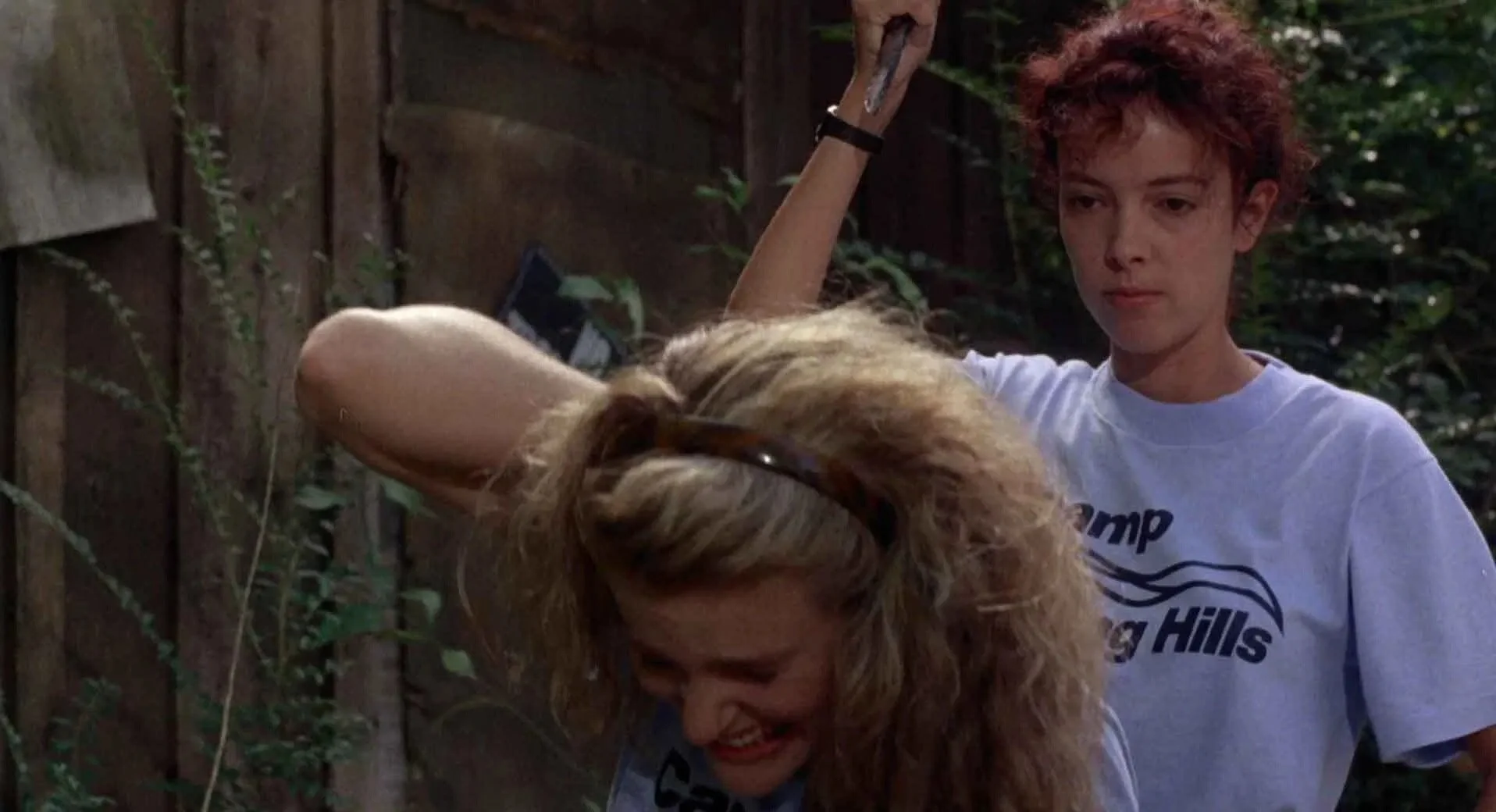[Pride 2020] Finding Your Identity at Sleepaway Camp
Let’s not beat around the bush: We all know the end of Sleepaway Camp. If you’re part of the horror community, chances are you know the ending to the infamous 1983 slasher. Yes, THAT ending. The ending that reveals that not only is main character Angela Baker (Felissa Rose) the killer, eliminating campers and counselors alike, but also reveals that she is in fact, transgender. Despite its somewhat problematic execution, Sleepaway Camp not only embedded its way into horror culture, but queer culture as well.
I’m not here to talk about that today. I’m here to talk about its less popular, though arguably just as good, sequels: Sleepaway Camp II: Unhappy Campers and Sleepaway Camp III: Teenage Wasteland. These films follow the exploits of an adult Angela (now portrayed by Pamela Springsteen) as she takes on a counselor role in Unhappy Campers and once again becomes a camper in Teenage Wasteland.
The most surprising aspect of these movies is the way they tackle the problematic reveal of the first film. In Unhappy Campers, it is established early on that Angela went on to have Gender Confirmation Surgery and it is almost completely dropped after that. As a transwoman myself, despite my love of the first Sleepaway Camp, the “shock” ending always put an knot in the pit of my stomach. The revelation almost feels like someone is exposing this awful secret like “look at her! Not only is she a killer, but a freak too”! I know this is all interpretation to the viewer themselves, but it always made me feel that the struggles with gender identity were very taboo.
Unhappy Campers confirms that Angela has completely adjusted to her identity. Always expected to be a good camper as a child, she holds up the new camp to her high standards and punishes every camper she deems “naughty” and chaos ensues. Unhappy Campers tonally takes a different direction than the first film as well. Whereas the first film was released in a sea of Friday the 13th and Halloween clones, this sequel takes the series into a Horror-Comedy direction that almost spoofs the genre. Uncommon for the time, it’s another reason Unhappy Campers stood out and has held up for me, after all these years. There’s even an infamous scene that hilariously spoofs Friday the 13th and A Nightmare on Elm Street and remains humorous to this very day.
Teenage Wasteland continues the tone Unhappy Campers established, except this time our now anti-hero Angela disguises herself as a fellow camper at Camp New Horizons, a camp that puts teens from rich and poor neighborhoods together for a summer they won’t (and can’t) forget. With filming starting just 1-2 weeks after Unhappy Campers, this particular installment feels like an extension of the previous film as it has the exact same tone and humor. Not a bad thing, but this installment doesn’t stand out as much. It introduces the dynamic of class difference, something I don’t think has been tackled enough in the slasher genre. It’s unique in that aspect and still a very worthwhile watch.
Now to the good stuff, this is where I get a bit personal. These movies are so important to me. Growing up I had always known there was something different about myself. Coming from a deeply Roman Catholic background, I was always told to pray away and suppress these certain feelings about myself. As a child my mom had introduced me to Halloween and this opened the door for me to a new genre of movies that would soon grow to be my favorite. The following summer, my grandmother took me to see Freddy vs. Jason in theaters and I was hooked.
My father regularly took me to Blockbuster Video where I would rent any and every slasher film. One fateful day I decided to rent Sleepaway Camp and reached the ending. It was the first time I realized that one could live as the gender they weren’t assigned to at birth. My religious upbringing and semi-sheltered childhood had hidden this away from me, but I knew the moment I saw it that those were my exact feelings. I was living as the wrong gender. I had struggled for many years following that trying any and everything to feel different, but those thoughts kept coming back to me. It was suffocating.
Then, in September 2019, after many therapy sessions, I came out. I had grown tired of trying to live how everyone else wanted me to live and decided my happiness and mental well-being was most important. My partner said they supported me, but I knew they were devastated and our relationship fell apart. My parents, despite their religious background, fully supported me and I know how blessed I am to have them support me as much as they do. The horror and film communities welcomed me with open arms. I’m now a staff writer for a female-focused film site where I regularly write about horror movies, and have had many opportunities to have my writing published. As a transwoman, this means the world to me. Our voices deserve to be heard and although there have been many great strides in the past few years, we have a lot of work to do still.
Sleepaway Camp, and horror films in general, will forever be important to me. They’re not afraid to take risks and tackle topics that mainstream films don’t. For better or worse these movies remain some of the most progressive films. Honestly, I can thank the Sleepaway Camp films for helping me find my identity and accept who I am as a person. As for the horror community given everything that’s gone on recently, I’m so proud to be a part of you and love to regularly see more queer voices being heard. We’re some of the most passionate and accepting people I’ve ever met and our shared love of horror and film as a whole will keep us together through these trying times.
As I wipe the tears from my eyes, I just wanted to let you all know what these films mean to myself, and if you look at these films in a new way from the eyes of someone who’s transgender, then that will make this all worth it.


![[Pride 2020] Finding Your Identity at Sleepaway Camp](https://images.squarespace-cdn.com/content/v1/5b39608d75f9eef54c62c3f0/1591364809130-TH80YCBS6A2KWGFTTHMX/A1plLK0uwjL._AC_SL1500_.jpg)




![[Pride 2020] For Sean, From My POV As A Horror Fan](https://images.squarespace-cdn.com/content/v1/5b39608d75f9eef54c62c3f0/1593484114370-B09RZEZ6FWKW8TFIG0NA/Sean%2Bpic%2B1.jpg)
![[Pride 2020] Finding Jennifer; Or, How I Learned to Stop Hating Jennifer's Body](https://images.squarespace-cdn.com/content/v1/5b39608d75f9eef54c62c3f0/1593483718013-3AP23VJDN9V0MMA6V3DU/51d02d6fb673bec72cb41a366c86bb39.jpg)
![[Pride 2020] Good Manners Deconstructs Class and Racial Disparities in Brazil](https://images.squarespace-cdn.com/content/v1/5b39608d75f9eef54c62c3f0/1593398398356-6QRX0G4PK4S87TKTMF0T/1270796_goodmanners_432313.jpg)
![[Pride 2020] The Power Of Difference In Hellraiser's Queerness](https://images.squarespace-cdn.com/content/v1/5b39608d75f9eef54c62c3f0/1593397752213-22GFO5I1QW8I220F5MZM/hellraiser_hed.jpg)
![[Pride 2020] Love, Trauma And Horror](https://images.squarespace-cdn.com/content/v1/5b39608d75f9eef54c62c3f0/1593323224833-38FH4ANZTM88LXS5HG5M/Hush.jpeg)
![[Pride 2020] A Lance in the Throat: Scary Heteros in Almodóvar’s “Matador”](https://images.squarespace-cdn.com/content/v1/5b39608d75f9eef54c62c3f0/1593322407370-GXK7L0BP0D7QNTN1FFPE/ede3ca1c-1165-11e8-9ac6-bbf931a203ee4.jpeg)
![[Pride 2020] The Mischa Project](https://images.squarespace-cdn.com/content/v1/5b39608d75f9eef54c62c3f0/1593231688339-UJSAXF4NN6K1ETEK9EBS/41000240.jpg)
![[Pride 2020] Another Cheater](https://images.squarespace-cdn.com/content/v1/5b39608d75f9eef54c62c3f0/1593230510967-BTX8BAR5VDNNJO58OW7V/knife.jpg)
![[Pride 2020] Extreme Horror And Queer Affirmation In Martyrs](https://images.squarespace-cdn.com/content/v1/5b39608d75f9eef54c62c3f0/1593140634217-BSFPGD1GVAV693B06Q1X/film_martyrs.jpg)
![[Pride 2020] "And I Still Don't Even Know How I Even Survive": Navigating Hard Times With Happy Death Day 2U](https://images.squarespace-cdn.com/content/v1/5b39608d75f9eef54c62c3f0/1593140172444-2JM3W35YYCJ9803EETB7/maxresdefault.jpg)
![[Pride 2020] Life Against The Dark: Growing Up And Coming Out With Hill House's Theodora](https://images.squarespace-cdn.com/content/v1/5b39608d75f9eef54c62c3f0/1593047800584-A79Y39E6S4OIURNI63GS/IMG_1438.JPG)
![[Pride 2020] Outside Of Laramie: Joy Ride (2001) As Gay Panic Horror](https://images.squarespace-cdn.com/content/v1/5b39608d75f9eef54c62c3f0/1593046627243-BQQZOWPMVE2TZKCYT90Z/519yvHX-bLL._AC_.jpg)
![[Pride 2020] A Bumpy Road Of Queer Gothic Resistance From The Old Dark House To The Rocky Horror Picture Show](https://images.squarespace-cdn.com/content/v1/5b39608d75f9eef54c62c3f0/1592959865412-WZQ8BTV28SHJX1WHEYK5/rocky-horror-sequel-01.jpg)
![[Pride 2020] Why Bisexual Representation In Jennifer's Body Matters](https://images.squarespace-cdn.com/content/v1/5b39608d75f9eef54c62c3f0/1592959284705-3SMVYNT4ZMWN0QADZJDB/jennifers-body.jpg)
![[Pride 2020] A Tribute To Kevin Williamson](https://images.squarespace-cdn.com/content/v1/5b39608d75f9eef54c62c3f0/1592881451514-Y4OPAHSXUI63FH3T7TB2/lockwood_williamson2.jpg)
![[Pride 2020] The Power Of The Trans Monster In Bit And Switch](https://images.squarespace-cdn.com/content/v1/5b39608d75f9eef54c62c3f0/1592880971405-NFCCXW50AVB1PIPZQZVW/MV5BOWE0YjFhYTUtMWE2Zi00OWJkLTg2MzItY2VlYzUxMWE4YTM3XkEyXkFqcGdeQXVyMjE5MzYzNjU%40._V1_.jpg)
![[Pride 2020] Passive Homophobia And Its Effect On Their LGBTQIA+ Audience](https://images.squarespace-cdn.com/content/v1/5b39608d75f9eef54c62c3f0/1592794014122-9YU0ZSHP1UUC4AZS2LSL/kelly-freddyvsjason1.jpg)
![[Pride 2020] There's A Monster At The End Of This Essay](https://images.squarespace-cdn.com/content/v1/5b39608d75f9eef54c62c3f0/1592793247165-0IRK6TCXUYLCYN41EGH5/sesame-street-the-monster-at-the-end-of-this-book-9780794440237.in01.jpg)
![[Pride 2020] Bisexuality in Genre: How Catherine Tramell Warped Sexuality Forever](https://images.squarespace-cdn.com/content/v1/5b39608d75f9eef54c62c3f0/1592708306869-A25JKBJ9WESFNUM9EFZJ/6bee9e40b42062fb5a4456c27a31b2e0.jpg)
![[Pride 2020] How Evil Dead 2 Helped A Trans Girl Find Herself](https://images.squarespace-cdn.com/content/v1/5b39608d75f9eef54c62c3f0/1592707596758-2ANPLJK8JEY9XX3HTCH4/0a1ccb15-21f6-4dc9-b1b6-635c40e0046e_1.e6d75d0b581b65da70719cdba2fd46d5.jpeg)
![[Pride 2020] The Spirit Of Thomas Carroll](https://images.squarespace-cdn.com/content/v1/5b39608d75f9eef54c62c3f0/1592624295460-BJ42D5K1DFKXCFRKN7KI/pexels-photo-1671325.jpeg)
![[Pride 2020] Sickos Never Scare Me](https://images.squarespace-cdn.com/content/v1/5b39608d75f9eef54c62c3f0/1592543280046-WRDU1JSIN3JB4W7OJUGB/catwoman-700x500.jpg)
![[Pride 2020] Lovecraft, Horror And Questioning Sexuality](https://images.squarespace-cdn.com/content/v1/5b39608d75f9eef54c62c3f0/1592542591836-SJXZY6P0OZUKZY8R1F6E/cthulhupostbig.jpg)
![[Pride 2020] In Defense Of And Against Richie's Secret In It: Chapter 2](https://images.squarespace-cdn.com/content/v1/5b39608d75f9eef54c62c3f0/1592457692112-AKTBKSAQ9GSR1DI8HIX9/5ca22ee726a592e1c6c4b42b379af52b9d6f09f5.jpg)
![[Pride 2020] Bloodthirsty Villains And Homicidal Maniacs...But Make It Gay](https://images.squarespace-cdn.com/content/v1/5b39608d75f9eef54c62c3f0/1592457031919-F7C0J9H77JJQ4H0S69KT/630e2b1afaaafb06d9728b9627532756.jpg)
![[Pride 2020] A Life Changing Excision](https://images.squarespace-cdn.com/content/v1/5b39608d75f9eef54c62c3f0/1592359171589-LWRXA6B3UHFSBL4WXIB4/Excision-Pic-2-800x330.png)
![[Pride 2020] Drag Me to Hell: An Incomplete History of the Intersection of Drag and Horror](https://images.squarespace-cdn.com/content/v1/5b39608d75f9eef54c62c3f0/1592358005266-TM3GTK2Q0UHANROZKE29/Nightclub+of+the+Living+Dead.png)
![[Pride 2020] From Villains To Heroes: Imperfect Women In Horror](https://images.squarespace-cdn.com/content/v1/5b39608d75f9eef54c62c3f0/1592267521002-M5YENUAM359R1LFXRKDK/intro-1514398906.jpg)
![[Pride 2020] "I always thought the only alien in this high school was me" - Navigating Identity In The Faculty](https://images.squarespace-cdn.com/content/v1/5b39608d75f9eef54c62c3f0/1592266793030-0M18Z90CRBEF2LDW3178/5142466d6f362f188229058788d9af42.jpg)
![[AYAOTD? Recap with Erin Callahan] 3.13 "The Tale of the Dangerous Soup"](https://images.squarespace-cdn.com/content/v1/5b39608d75f9eef54c62c3f0/1591282380480-7O1MGQL59YD7U6F2FIUJ/3.13+Dangerous+Soup.jpg)
![[Review] Shirley is a Haunted House Movie Whose Ghosts are Flesh and Blood](https://images.squarespace-cdn.com/content/v1/5b39608d75f9eef54c62c3f0/1591281441681-LAJHQONFAALYDB8T75JV/Shirley_Poster.jpg)
![[Pride 2023] Catharsis in the Dark Camp of Sleepaway Camp II: Unhappy Campers](https://images.squarespace-cdn.com/content/v1/5b39608d75f9eef54c62c3f0/1686606774802-ZCH6GTCWBKZCH5L14OOU/Sleepaway-Camp-2-Unhappy-Campers-1988-poster.jpg)